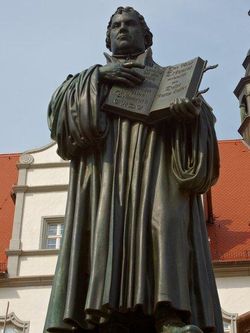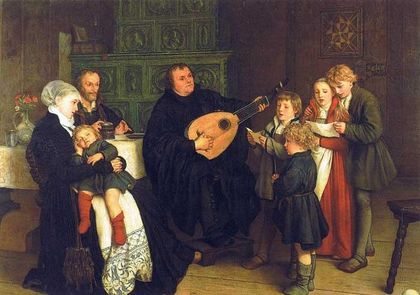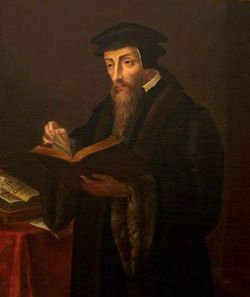Here I stand— the protest that saved the Church and Changed the World (II)
Let’s take a look at a few of the many positive changes which sprang from the Reformation.
20 NOVEMBER 2017 · 11:00 CET
Read part I of this article.
How did the Protestant Reformation change our world?
The Reformation became a complex movement, as God moved men and women in different regions across Europe who had different theological perspectives, different personalities and working in different circumstances.
The Reformers like Luther, Calvin, or Zwingli had strong disagreements among themselves on what we would call secondary issues. The Reformation developed in England one way, but in quite a different way in Scandinavia or in Germany. But let’s take a look at the big picture of how the Reformation changed the world.
And yes, let’s just admit right up front, there were some bad things that happened during the Reformation. There were wars, killings, brutal acts, and persecution in response to the centuries of harsh Catholic abuse and domination. Eventually, some of the different wings of Protestantism started persecuting each other.
The Reformers did not always live out their own biblical principles. Why? Because although they were brilliant, courageous, and dedicated but they were flawed, broken, just as we are.
Since they were building essentially a whole new Church movement and a new kind of civilization, their mistakes reverberated widely. But, just as we see with Bible heroes, God used them to accomplish His purpose, warts and all.
There were also unintended consequences nobody could have anticipated or planned for. But all that’s another story that deserves it’s own telling at another time.
So let’s take a look at a few of the many positive changes which sprang from the Reformation. I’ll paint in broad strokes, giving an overview. Naturally, as an academic, I have to admit. there are exceptions and distinctions that would need to be made in a more detailed view.
But for now, let’s look at the big picture. Maybe later we can zoom in on a more detailed perspective.
Theological Changes
Three fundamental theological insights of the Reformation led to all the other cultural and political changes.
1. The Reformation changed our view of salvation

But the Reformers responded that what they were teaching was simply a return to biblical Christianity. They insisted that they were not the innovators, it was the Roman Catholics who were the “innovators and heretics.”
In most Catholic and Orthodox regionss of Europe still today, evangelicals are called a cult. But we can respond confidently, “God’s Word speaks clearly that salvation is by faith alone and by God’s grace alone.” This is not innovation or heresy, it is simply the Bible’s plain teaching.
2. The Reformation changed our view of the Bible.
The Roman Catholic Church insisted that church tradition had equal authority, and sometimes more authority than the Bible, because it determined how the Bible was to interpreted.
But the Reformers insisted that the Bible is our final authority, not the Church—sola Scriptura. Luther, Calvin and the other Reformers are well-known for their high teaching that the Bible is inspired by God, it is reliable and trustworthy, without error.
Luther loved the Bible. He said, “The Bible is alive, it speaks to me; it has feet, it runs after me; it has hands, it lays hold of me.” He actually had huge portions of the Bible memorized.
Luther explained how to read the Bible. “For you are to deal with the Scriptures in such a way that you think that God Himself is speaking to you there.” He flatly stated, “The Scriptures have never erred.”

We must understand Luther was able to declare, “Here I stand!” and stake his life on it, because he really believed sola Scriptura.
The other great Reformer, John Calvin also taught that the Bible is the inerrant, inspired Word of God. He declared, “Our true wisdom is to embrace with meek docility, and without reservation, whatever the Holy Scriptures, have delivered.”
3. The Reformation changed our view of the Church.
Before the Reformation, the Church was viewed by most people as the source of salvation, the dispenser of God’s grace and as the only authority on what the Bible means. But the Reformation returned to the Bible’s teaching that the Church is the people of God. Christ alone—solus Christus—is the dispenser of God’s grace.
These three foundational theological led to all the other changes that were to follow.
4. The Reformation changed worship.
For the Protestants, the Bible and the preaching of the Bible was now central. Communicating the Word has priority in worship, just as it did in the New Testament. Gradually the architecture of Protestant churches changed to place the pulpit in the central place instead of the altar where mass was celebrated.
The Reformation brought congregational singing to our worship services. Now people could sing as they worshipped and they could sing in their own language!
Luther loved music and was a musician himself. He said, “Next to the Word of God, the noble art of music is the greatest treasure in the world.” He wrote 36 hymns which were loaded with theology. Of course, the most famous is, “A Mighty Fortress Is Our God.” But his other hymns deserve to be sung as well.

Congregations actually gathered during the week to practice singing for the services on Sunday. The Protestants sang in their homes, at their work, throughout the week. The Reformation went forward singing.
One Jesuit, an enemy of the Reformation, said scornfully, Luther’s hymns “killed more souls than his works and sermons.” The British historian Dairmaid MacCulloch calls the Reformation hymns “one of the secret weapons” of the Reformation.
5. The Reformation launched a fresh vision for evangelism and missions.
The medieval Catholic Church had three main methods of “evangelism” outside of preaching:
- Absorption of the host culture.
- Conquest through the conversion of kings, and
- Coercion
For five years Teri and I lived in Lithuania which was an area targeted by various popes through military campaigns that were called the Northern Crusades. The motto of these killing armies sent by the pope was “Repent or die.”
Lithuanians would often boast to us, “We were the last nation in Europe to convert to Christianity.” But the real surprise is when you find out how Lithuania was “converted.” A papal edict (called a “bull”) on March 13, 1147, Divina dispensatione (“Divine Dispensation”) authorized making war on unconverted pagans.
This was a war of forced conversion. Actually, they were called “wars of conversion” A long line of popes were “ready to employ war, diplomacy, propaganda, bargaining, blackmail and bribery to achieve their ends” of domination.
One of my favorite hymns, "O Sacred Head Now Wounded," was written by St. Bernard of Clairvaux. But this same Bernard urged the crusaders to fight the heathen "until such a time as, by God's help, they shall be either converted or deleted."
I grew up in a conservative holiness church. We had some pretty intense altar calls, but we were never told, “Get saved or we’ll kill you.” These Catholic armies took “high-pressure evangelism” to a new low.
After the Reformation spread like wildfire through much of northern Europe, the Roman Catholic Church used coercion as a key weapon in their Counter-Reformation. After much of Lithuania and Belarus converted to Protestantism, the Catholics forced many Protestants to flee to Western Europe and the Orthodox were forced to go to Russia.
Did the Reformation have a missions vision?
Some mission experts like Ralph Winter have claimed the Reformation didn’t have a mission vision. Unfortunately, Winter was simply not looking at the historical record and letting the Reformers and their actions speak for themselves.
The Reformation was missional at its core. The central message of the Reformation was justification by faith. The Reformers had spent their entire lives in the Roman Catholic Church and never heard the Good News.
So they knew they were surrounded by others who had not heard it either. This was their field for evangelism. It was God’s time for Europe to hear the Gospel!
Luther’s passion for evangelism
Evangelism and missions was a frequent topic in Luther’s preaching. In one sermon Luther declared, “The Gospel…is to be preached and proclaimed to all the world,….” He urged Christians to remember that they were “sojourners” here on earth but while they are here, they are to “help others and bring them also to heaven.”
Throughout most of his ministry, Luther promoted loving the Jews and sharing Christ with them. He wrote a booklet in 1523, “Was Jesus Christ born as a Jew?” to convince Protestants they must reach the Jews.
This is within six years of nailing the 95 theses to the church door. This was a priority for him. He met with Jewish scholars and had discussions with them. He urged one of his friends to work among the Jews in Germany.
Sadly, later in his life, for a time, Luther moved away from this burden to love and reach Jews and became negative toward them. Admittedly, Luther’s statements are relatively mild compared to the harsh anti-semitism of many Catholic leaders. But he should have known better.
There is no excuse, but his weird, offensive anti-semitic statements came during a serious time of illness in his later years. Thankfully, in the last sermon he preached in February 1546, he again “expresses hope and missionary concern for the Jews….emphasizing Christian love and prayer as a means of leading Jews to their Messiah, Jesus Christ.”
Under Luther’s leadership, German Protestants quickly began sending missionaries to help Lithuanians, Poles, Danes, Swedes and others throughout Europe embrace the truth of salvation by faith. Lutherans quickly spread the Gospel in many places throughout Europe. Look at the amazing spread at just a few places.
- Denmark, new translation of Bible in 1524
- Lutheran ministry began in Hungary in 1531
- Iceland, New Testament, 1540,
- Finland, Moravia, and the Baltics.
Calvin’s vision to spread the Gospel
As a refugee from his homeland France, Calvin had a real burden to reach France with the Gospel. So in 1553, Calvin’s missionaries began evangelizing and planting churches there. They were amazingly successful. Look at the amazing spread of Protestantism in France:
- 1555: 5 Calvinist churches
- 1559: Nearly 100
- 1562: 2,150, with 3,000,000 members
In 1557, early in the Reformation period, Calvin sent missionaries from Geneva to Brazil. He also sent missionaries to India and elsewhere.
6. The Reformation shaped many languages through Bible translations.
Since the Bible is God’s Word and our final authority, and since everyone needs to read the Bible for themselves, the Reformation sparked an explosion of Bible translations. During the months he spent in hiding in the castle at Wartburg after the Diet of Worms, he translated the Bible into German. It was a real, earthy, understandable German. German friends tell me that their language is still influenced by Luther’s translation.

- French
- Italian
- Dutch
- Lithuanian
- Latvian
- Russian
- Bulgarian
7. The Reformation sparked a global transformation of education.
The Reformation was born at the university. Luther was brilliant and well-educated. He was a professor and many of the other Reformers were scholars as well. God used Luther’s academic training and his intellectual skills combined with his thirst for God to bring him the insight that gave birth to the Reformation.
The Reformation “originated in a scholar’s insight, born equally of spiritual struggle and hard intellectual labor.”
The Reformation brought many changes to education.
- Protestants started numerous universities.
- Universal compulsory education for boys and girls. Since the Bible is the Word of God and everyone needs to be able to read the Bible, all boys and girls should be educated. The Reformers established hundreds of primary and secondary schools.
- Protestant regions of Scotland and Germany were the first in history to abolish illiteracy, because of their insistence on universal compulsory education.
- Luther insisted that every town should have a library.
- Even teaching methods were changed by the Reformation to a “kinder, gentler” approach. Jan Amos Comenius, a third-generation Reformer advocated a healthy, effective Christian approach to education.
8. The Reformation changed our view of the world and what is sacred and secular.
The medieval Catholic church divided the world between things that are holy or sacred and things that are secular or less sacred. With this view, many things were unspiritual—the body, sex, work, commerce, business, non-religious art. We call this “the sacred/secular split.” So for Catholics,
- Serving mass was a holy task.
- Serving food to your family was not a holy task.
- Giving money to the Church—a holy task.
- Making money through business or craftsmanship, not holy.
In contrast, Reformers taught that the Lordship of Christ extends to all of life—not just praying, reading the Bible and going to church, but fulfilling our daily tasks as we serve God and serve others.
9. The Reformation changed our view of work.
The medieval Catholic Church viewed work, especially business and manual labor, as unspiritual. They made a clear distinction between people in priesthood and those who were not. The “spiritual” people became priests, monks or nuns. Everything non-religious was considered second-best and less spiritual.
But the Reformers saw that in the New Testament, there are not two classes of citizens—those in the priesthood or ministry and the “laymen.” The Reformation emphasized the priesthood of all believers. We are all ministers of the Gospel. So Protestants served God through their work.
Work became honorable and even holy. We can bring glory to God through our work, not just through “spiritual” activities such as prayer and church, as important as these are, but through our daily duties. Every believer is a “priest” who is in “full-time Christian service.”
Martin Luther said the maid who is cooking, making the bed, sweeping the house, can say, “Why, my service is equal to cooking for God in heaven!”
This revolutionary view that work is good and godly led to what was much later called the Protestant work ethic. People worked harder and recognized that their work was an important part of their service to God, part of their ministry and their calling.
10. The Reformation changed our view of money.
Medieval Catholics taught that poverty was a virtue and could actually help you earn salvation. Francis of Assisi equated poverty with righteousness.
In contrast, Luther protested that poor people are not more holy because of their poverty. He said, “Poverty is not to be recommended, chosen, or taught.” Earning money is a good thing to do because the Bible commands us to work and to earn money to care for our families and to give for others.
Since salvation is indeed by faith alone, then being poor certainly won’t help us earn our salvation.
The Reformers practiced generous living. Luther himself was so generous that he gave away most of his money. He could have been very wealthy but he didn’t take any royalties from his books.
11. The Reformation empowered the individual.
When Luther declared “I cannot and I will not recant anything, for to go against conscience is neither right nor safe,” he set in motion a major change in how Western civilization would view the individual. This empowered the individual and eventually led to a recognition of human rights.
Each person is created by God so they deserve respect and honor. Reformation individualism was responsible and accountable because it was rooted in the dual biblical doctrines of creation—we are created by God and total depravity—we are fallen, broken. This Reformation individualism re-shaped the cultures of northern Europe and North America.
12. The Reformation brought more freedom of religion—eventually.
The medieval Catholic Church was a political machine, tyrannical in its attempt to control people, and especially their religious practices. Part of the reason the Reformation movement spread quickly was because the average German was tired of the political, economic and religious oppression of the Catholic Church. The Reformers responded that God gives us freedom and we should give freedom to others, including the freedom worship as they choose.
Tragically, the actions of some of the Reformers show how quickly power corrupts. Calvin, in his 1536 Institutes, promoted religious freedom “not just of Protestants, but of all peaceable believers, including Catholics, Jews, and Muslims.”
Unfortunately, a few short years later when Calvin gained control of Geneva, he punished and even executed some who disobeyed his own religious laws. Other Protestants began oppressing fellow-Protestants. After the Synod of Dordt in Holland, the Calvinists beheaded one Arminian leader and deported and defrocked all the other 200 Arminian pastors.
Puritans in England were persecuted and outlawed by the English Protestant powers. Then in the ultimate irony, when the Puritans immigrated to America and established their own government in Massachusetts, they persecuted and drove out the Baptists and the Quakers. How quickly we forget.
But even in this mess we see two pieces of good news in this sad record on religious freedom. At least, Protestants rarely used force to coerce conversion. Secondly, the Reformation laid the theological groundwork for a fuller recognition of freedom of religion later.
Daryl McCarthy serves as Vice President of Academic Programs and Strategy with Forum of Christian Leaders (FOCL).
Published in: Evangelical Focus - Forum of Christian Leaders - Here I stand— the protest that saved the Church and Changed the World (II)
